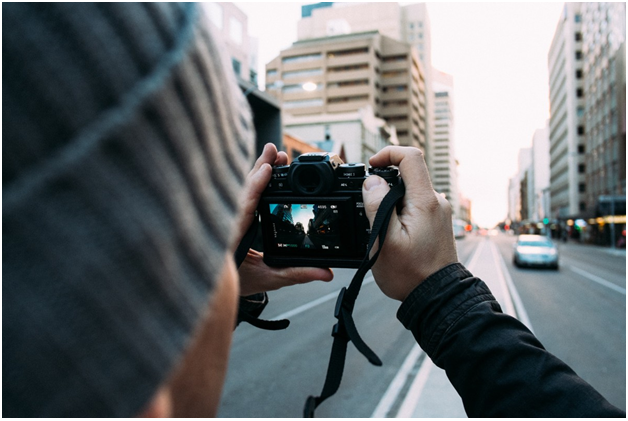Let’s face it. Choosing which camera to buy is tough and challenging. Once you decide to infiltrate into the world of digital photography, one of the many things that you should understand right away is how to differentiate DSLR cameras vs. point and shoot cameras.
Keep in mind that these two types of photographic equipment vary quite a bit with regards to the image quality, the price, as well as the performance speeds, and size. If you are serious and sincere about your photography skills, you’d likely want a DSLR. If you are a casual shooter, you’d probably want a point and shoot camera.
However, if you are somewhere in the middle, then it’d be wise to know the pros and cons of both cameras. For a little help, check out the guide below. Read on to understand each camera and then choose which camera suits you best.
Digital Single-lens Reflex Camera
Over time, the digital single-lens reflex camera also known as digital SLR has been the leading option for anyone who would like to take their photography skills to the next level. They can buy it almost anywhere like in any online stores like Deal Wiki. Whether you are a professional or a beginner, a DSLR offers three features – interchangeable lenses, manual controls, and excellent picture quality.
DSLR Strengths
- One of the leading advantages of having a DSLR is its image quality. Because DSLRs have a bigger size of image sensors, while a point and shoot camera has about 5 percent of sensor area of a DSLR, they also have larger pixel sizes. With that said, one can use a DSLR at a faster ISO which leads to quicker shutter speeds and reduced grain.
- A DSLR’s capability to swap different lenses sets up a world full of possibilities and potentials for photographers. Though point and shoot cameras these days has 3x Optical Zoom and others may have longer ones, one can fit a DSLR with various high-quality lenses from super long focal lengths to wide-angle based on what you’re photographing. Plus, DSLRs can easily adapt to various situations. Take note that the difference in the quality of lenses is vast and the image quality highly depends on the quality of the lens you use.
- One of the best things about having a DSLR is its speed. DSLRs are, for the most part, faster than any other type of camera when it comes to starting it up, shutter lag, and focus.
- DSLRs are, on average, made up of reflex mirrors. Meaning, you see what you shoot. You can directly see what you are photographing through the lens, not in a see-through aperture in the camera.
- With DSLRs, you’re completely responsible for bringing everything in the point of convergence through the aperture control of the lens or isolating foreground from the background. Know that some telephoto and portrait lenses can, without a doubt, bring your subject into focus and develop beautiful and creamy background blur, commonly known as bokeh.
- DSLRs have better responsiveness to light. Strictly speaking, you can work well in dark and dim environments and take photos that you’d never be able to capture with a point and shoot camera.
- Even though this type of camera is not, for the most part, made for simplicity as other cameras are. Therefore, you’ll need to search for controls and buttons on this camera compared to a point and shoot camera. But once you master using the controls, you will be able to change the settings quickly, if needed.
- DSLRs are a much better investment than point and shoot cameras. Lastly, DSLRs have better construction. That said, rest assured that they will last longer.
DSLR Downsides
- Because of the nature of this type of camera and its structure, when the shutter unfastens and closes, there’s a minimal amount of noise that leaks from the camera.
- DSLRs are more costly than point and shoot cameras. Even a second-hand DSLR camera will most probably cost a lot than state-of-the-art point and shoot camera. However, keep in mind that the expense doesn’t stop with the photographic equipment itself. You may need to spend more on accessories as well.
- DSLRs are big and heavy.
- When you buy a DSLR camera, you’ll need to invest tons of your time learning the buttons and controls, frustrating lots of people with this process.
- Aside from the fact that DSLRs have a higher price tag, the expense of ongoing maintenance is also expensive. Dust and dirt can get into the camera sensor and lenses. Thus, you’ll need to consider the expense of maintenance on DSLRs.
Point and Shoot Camera
Also known as compact cameras, a point, and shoot camera is a type of camera intended for simple operation. A lot of people loves using this type of camera because of their vernacular photography. Meaning they are easy to use for events like reunions and parties.
Point and Shoot Camera Strengths
- The leading advantage of a point and shoot camera is its size. One can easily tuck this type of camera into their pocket or bag, and take them anywhere.
- Aside from its size, nearly all point and shoot cameras are compact and portable. You won’t need tripods, extra bags, and any other photography accessories to bring with you.
- Almost all point and shoot cameras have fixed lens. With that said, you’ll never have to exert much effort in changing the lens.
- It’s not expensive as compared to DSLR cameras.
Point and Shoot Camera Downsides
- Because it’s smaller than a DSLR camera, the camera sensor is also smaller in size, resulting in poor image quality with more megapixels.
- This type of camera is not upgradable. Meaning, you will not be able to change its lenses.
- Point and shoot cameras offer you lesser control when taking pictures. You have limited control over the shutter speed and aperture, as well as the distance marking on the external mount flashes.
- The image quality is poor when doing night photography. Point and shoot cameras do not respond to the light that well.
- Point and shoot cameras are incapable of capturing wide-angle shots. You won’t be able to fit all the scene and would require you to move back to capture more.
Takeaway
There’s no denying that it’s hard and difficult to find the right camera for you and your needs. With that said, it’s very important to weigh in the pros and cons of the camera you’d want to have. If you haven’t decided which camera you’d choose, from DSLR to point and shoot camera, then consider their strengths and weakness above.


